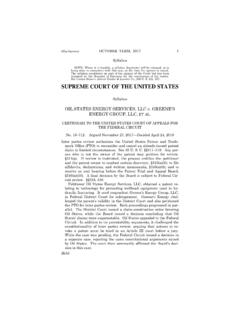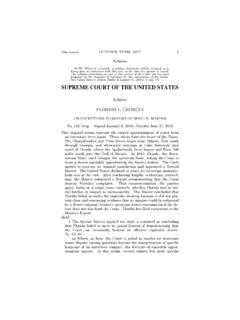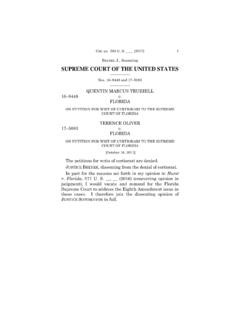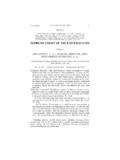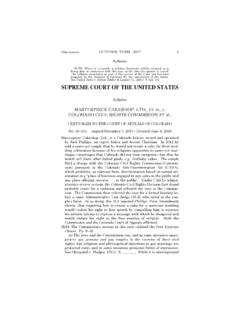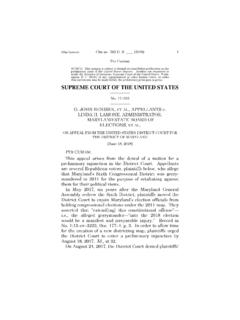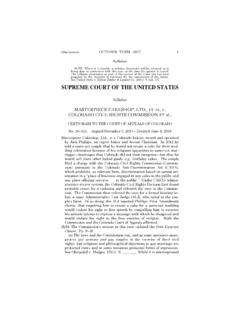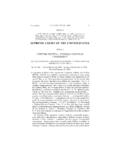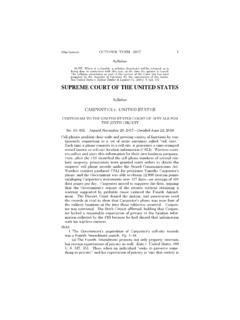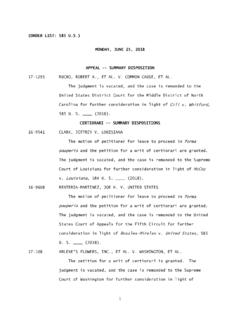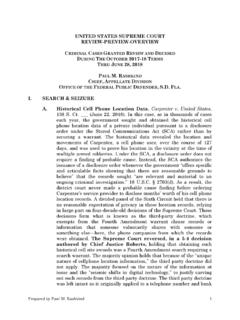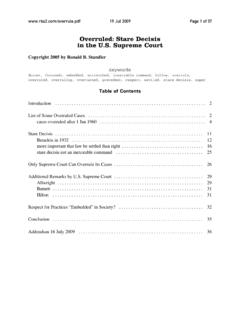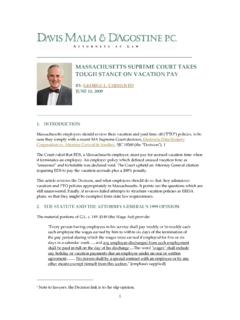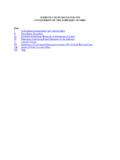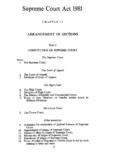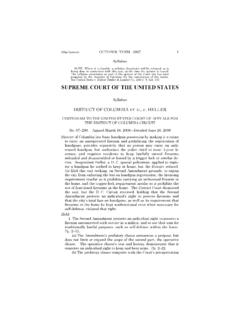Transcription of SUPREME COURT OF THE UNITED STATES
1 1 (Slip Opinion) OCTOBER TERM, 2005 Syllabus NOTE: Where it is feasible, a syllabus (headnote) will be released, as isbeing done in connection with this case, at the time the opinion is syllabus constitutes no part of the opinion of the COURT but has beenprepared by the Reporter of Decisions for the convenience of the reader. See UNITED STATES v. Detroit Timber & Lumber Co., 200 U. S. 321, 337. SUPREME COURT OF THE UNITED STATES Syllabus hamdan v. RUMSFELD, SECRETARY OF DEFENSE, ET AL. CERTIORARI TO THE UNITED STATES COURT OF APPEALS FOR THE DISTRICT OF COLUMBIA CIRCUIT No. 05 184. Argued March 28, 2006 Decided June 29, 2006 Pursuant to Congress Joint Resolution authorizing the President to use all necessary and appropriate force against those nations, or-ganizations, or persons he determines planned, authorized, commit-ted or aided the September 11, 2001, al Qaeda terrorist attacks(AUMF), U.
2 S. Armed Forces invaded Afghanistan. During the hos-tilities, in 2001, militia forces captured petitioner hamdan , a Yemeni national, and turned him over to the U. S. military, which, in 2002,transported him to prison in Guantanamo Bay, Cuba. Over a yearlater, the President deemed hamdan eligible for trial by militarycommission for then-unspecified crimes. After another year, he was charged with conspiracy to commit .. offenses triable by militarycommission. In habeas and mandamus petitions, hamdan assertedthat the military commission lacks authority to try him because (1)neither congressional Act nor the common law of war supports trial by this commission for conspiracy, an offense that, hamdan says, isnot a violation of the law of war; and (2) the procedures adopted totry him violate basic tenets of military and international law, includ-ing the principle that a defendant must be permitted to see and hear the evidence against him.
3 The District COURT granted habeas relief and stayed the commis-sion s proceedings, concluding that the President s authority to estab-lish military commissions extends only to offenders or offenses triableby such a commission under the law of war; that such law includesthe Third Geneva Convention; that hamdan is entitled to that Con-vention s full protections until adjudged, under it, not to be a prisonerof war; and that, whether or not hamdan is properly classified a pris-oner of war, the commission convened to try him was established in 2 hamdan v. RUMSFELD Syllabus violation of both the Uniform Code of Military Justice (UCMJ), 10U.
4 S. C. 801 et seq., and Common Article 3 of the Third Geneva Con-vention because it had the power to convict based on evidence the ac-cused would never see or hear. The D. C. Circuit reversed. Althoughit declined the Government s invitation to abstain from consideringHamdan s challenge, cf. Schlesinger v. Councilman, 420 U. S. 738, the appeals COURT ruled, on the merits, that hamdan was not entitled to re-lief because the Geneva Conventions are not judicially enforceable. The COURT also concluded that Ex parte Quirin, 317 U. S. 1, foreclosed anyseparation-of-powers objection to the military commission s jurisdiction, and that hamdan s trial before the commission would violate neither the UCMJ nor Armed Forces regulations implementing the GenevaConventions.
5 Held: The judgment is reversed, and the case is remanded. 415 F. 3d 33, reversed and remanded. JUSTICE STEVENS delivered the opinion of the COURT , except as toParts V and VI D iv, concluding: 1. The Government s motion to dismiss, based on the Detainee Treatment Act of 2005 (DTA), is denied. DTA 1005(e)(1) providesthat no COURT .. shall have jurisdiction to hear or consider .. an application for .. habeas corpus filed by .. an alien detained .. at Guantanamo Bay. Section 1005(h)(2) provides that 1005(e)(2) and(3) which give the D. C. Circuit exclusive jurisdiction to review thefinal decisions of, respectively, combatant status review tribunalsand military commissions shall apply with respect to any claim whose review is.
6 Pending on the DTA s effective date, as was hamdan s case. The Government s argument that 1005(e)(1) and(h) repeal this COURT s jurisdiction to review the decision below is re-butted by ordinary principles of statutory construction. A negativeinference may be drawn from Congress failure to include 1005(e)(1)within the scope of 1005(h)(2). Cf., , Lindh v. Murphy, 521 U. S. 320, 330. If .. Congress was reasonably concerned to ensure that[ 1005(e)(2) and (3)] be applied to pending cases, it should have beenjust as concerned about [ 1005(e)(1)], unless it had the different in-tent that the latter [section] not be applied to the general run of pending cases.
7 Id., at 329. If anything, the evidence of deliberateomission is stronger here than it was in Lindh. The legislative his-tory shows that Congress not only considered the respective temporalreaches of 1005(e)(1), (2), and (3) together at every stage, but omit-ted paragraph (1) from its directive only after having rejected earlier proposed versions of the statute that would have included what isnow paragraph (1) within that directive s scope. Congress rejectionof the very language that would have achieved the result the Gov-ernment urges weighs heavily against the Government s interpreta-3 Cite as: 548 U. S. ____ (2006) Syllabus tion.
8 See Doe v. Chao, 540 U. S. 614, 621 623. Pp. 7 The Government argues unpersuasively that abstention is ap-propriate under Councilman, which concluded that, as a matter of comity, federal courts should normally abstain from intervening in pending courts-martial against service members, see 420 U. S., at740. Neither of the comity considerations Councilman identified weighs in favor of abstention here. First, the assertion that militarydiscipline and, therefore, the Armed Forces efficient operation, are best served if the military justice system acts without regular inter-ference from civilian courts, see id., at 752, is inapt because hamdan is not a service member.
9 Second, the view that federal courts should respect the balance Congress struck when it created an integrated system of military courts and review procedures is inapposite, sincethe tribunal convened to try hamdan is not part of that integrated system. Rather than Councilman, the most relevant precedent is Ex parte Quirin, where the COURT , far from abstaining pending the con-clusion of ongoing military proceedings, expedited its review becauseof (1) the public importance of the questions raised, (2) the COURT s duty, in both peace and war, to preserve the constitutional safe-guards of civil liberty, and (3) the public interest in a decision onthose questions without delay, 317 U.
10 S, at 19. The Government has identified no countervailing interest that would permit federal courtsto depart from their general duty to exercise the jurisdiction Con-gress has conferred on them. Pp. 20 The military commission at issue is not expressly authorized byany congressional Act. Quirin held that Congress had, through Arti-cle of War 15, sanctioned the use of military commissions to try of-fenders or offenses against the law of war. 317 U. S., at 28. UCMJ Art. 21, which is substantially identical to the old Art. 15, reads: Thejurisdiction [of] courts-martial shall not be construed as deprivingmilitary commissions .. of concurrent jurisdiction in respect of of-fenders or offenses that by statute or by the law of war may be triedby such.
